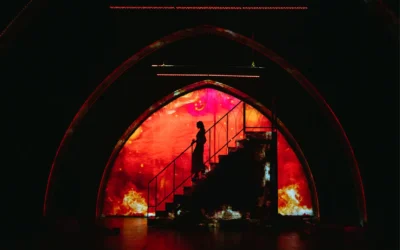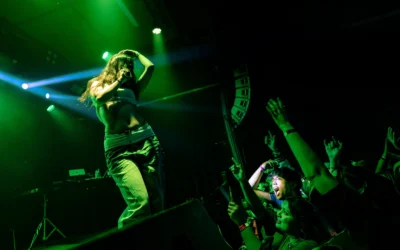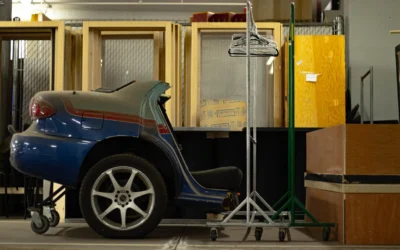For many post-secondary students, the experience of university can be stressful. There’s loans to worry about, getting to class on time, staying on top of grades, and maybe even trying to hold down a job. For many of these students, the weight of a washroom door or the amount of carpet on campus or a professor’s policy of handing things in as hardcopy are probably not even on the radar — but that might be because they’re able-bodied.
For other students, students using mobility aids or living with a disability, these seemingly small things actually have a serious impact on their experience at school, and must be contended with on a daily basis. All of which adds up.
I sat down with three students to discuss their experience of accessibility on MacEwan University campus, and in Edmonton more generally. Unfortunately, much of their interviews had to be trimmed for brevity, Shy Fudger (they/them), a third year Bachelor of Arts student who uses an electric wheelchair, had this to say:
“I am actually transferring out to go to (University of Victoria). It’s my dream school and I’m very excited, but I’m moving out of this city because it’s impossible for me to move around here .… What’s happening with our healthcare right now is really scary, too, and about 50 per cent of me leaving is because of that, and about 50 per cent of me leaving is because I can’t really navigate (in the winter).”
“Honestly, there are many many issues with access in this city. One would be, first and foremost because it is so prevalent, is snow removal. People don’t shovel their walks, people don’t clear their snow, people half-assedly shovel their walks, and I can’t get through it. This obviously poses an issue when I try to leave my house, come to school, go to work, et cetera. I have to call in to work shifts a lot because everywhere will be cleared except for one spot and that’s the only way I can go through.”
“It’s scary. I find myself — when it starts to snow feeling fear .… I don’t know if anyone is going to be around to help me if something does happen, like … because of the little access issues, they grow into this big thing where I am confined to one washroom stall, my classrooms, and my house. That’s my only sort of pathway. Yeah, it is fear. You learn to deal with it, but when I think about it, it is definitely there.”
“Another thing with that is when it gets cold, MacEwan turns off all of their automatic doors. All of them .… When all of the automatic doors are shut off, I have to sit outside of the building and wait for somebody to help me open the door or just struggle my way through, and I know that some people can’t struggle their way through. It’s little things that people really don’t think about, and that’s kind of what the problem is, that it’s not being thought about.”
“Like the SAMU building went into construction in what, 2017? Where is the universal design aspect of that building? Why was it not designed with disabled people in mind? Because there’s no excuse, same with Allard Hall, it opened in 2017. Universal design has been around for decades, there is no excuse for institutions to not be upholding that when they’re building new structures. I understand it’s one thing with retrofits. I understand that’s something that’s really difficult, costs a lot, but you should still do it. It’s not an excuse, but I can understand why it wouldn’t happen immediately. But if you have the money to build a new building from scratch, it should be completely integrated, 100 per cent accessible, no issues.”
Melissa Banks (she/her), a fourth year Bachelor of Arts student who is blind and uses a guide dog, adds:
“I have (studied) at two universities and my experiences at both of them have been very different, in some aspects. The university I went to in B.C. had, for instance, Braille signage. For the classrooms, for the washrooms … so it was easy for me to find a classroom, double check I was in the right classroom, double check that I’m going into the washroom that I want to go into. All of their signs were labelled.”
“(At MacEwan), as an average student going to class and going to find my professors’ offices, there’s no Braille signage. Ultimately that’s what I mean when I want to have an accessible experience at university, it’s to be able to independently find my classes on the first day and to find my professors’ offices. When you say there’s ‘not much Braille signage’ that implies that there is a useful amount, and there is not. It’s minimal, and it’s not covering the majority of places that you would go as a student.”
“I brought this up once to some people and … they said ‘well no one’s complained before, so we don’t know what your problem is.’ And I’m like, well I’m complaining now! There are staff members that are blind too! I don’t know, it would make more sense, and yeah it would be a cost, but it would definitely make my life easier.”
“Literally every semester I have to get someone on my own time to come in and show me where my classes are for the next semester. I cannot find them myself. That’s not something everybody else has to do.”
“I’d say that over half the stress I have in university is completely unrelated to actually studying and writing exams and writing research papers, over half the stress I deal with has to do with getting materials and if professors will actually accommodate me. I use a computer during class, I have accommodations, I am allowed to use a computer, but there are some professors who will, on the first day of class, rant and rave about the evils of technology in the classroom. So I’m sitting there, using my computer and not putting it away like everybody else and just, feel the spotlight being put on me in that way.”
“I used to have another minor, I had two minors, and I had to drop it because I had a professor in that subject area who refused to enact the accommodations that I needed .… I ended up dropping that whole subject because I would have had to deal with that professor again. I couldn’t deal with it. Sometimes you can fight and sometimes you can’t, and I just didn’t have the strength to want to tackle the whole system at that time.”
“The one thing that the other university I went to had that MacEwan doesn’t is an Accessibility Advisory Committee. They actually had a committee where they had members from all the different departments and some student representatives — I was on this committee — and we talked about disability on campus and the problems that we saw and what we could do. And they did actually fix things. … On one hand it was kind of problematic because I was the only person on the committee who had a disability, but at least they were trying. I was their token disabled person, but it was a step, and I did feel that I somewhat had a body that I could bring my concerns to, that they would listen.”
Natasha Mackinley, (she/her), who is a third year Accounting and Strategic Measurement student and uses a wheelchair, also had this to say:
“This will be my third year here at the school, and … none of the student election campaigns that I can recall, there has never been an individual that has tried to address any accessibility within the school. It’s always been something else that’s been their go-to. As being what they would consider as part of the minority, that’s kind of a frustration, because you can see it’s little things they would have to adjust that could make a huge difference, that they just don’t think about and don’t have an interest in changing.”
“MacEwan campus isn’t terrible, it’s nice that it’s connected. I live in residence and that’s one downfall, which is that even though it’s on campus, it isn’t connected, so I still have to fight through the snow and slush. So there’s some days that I look out my window and go ‘I guess I’m not going to class today’ because they haven’t gotten around to clearing the snow. So, yeah, that’s probably my biggest pet peeve with living on campus is that there’s still days I can’t get to class.”
“One of my bigger pet peeves is the volume of carpet in the building. I get it’s easier to make it look clean and (has) easier maintenance, but it just creates that extra resistance that makes it harder. Most of the time I won’t even travel on the second floor, I’ll go downstairs because it has the laminate flooring that I can cruise along on that’s a lot easier.”
“Another one that I know, (from) talking with Services to Students with Disabilities (SSD), that they’ve tried to portray to the school as something they should probably change is the lower down level of the cafeteria. Because those ramps, especially if I have my book bag, which adds 20 pounds onto my back, those ramps can get challenging. Between them being carpeted and I don’t think they’re quite to grade anymore — they might have been when they were built — but I think things have changed. So, that’s probably one of my biggest ones. I normally just get whatever from the Bean’s List or the (Griffins Landing) or Starbucks, because I don’t want to fight with it.”
“My other problem that I find in a lot of bathrooms is, even if they have sinks that we can get under and have the clearance and everything, the distance away that they put the soap and the hand dryers. It’s just really hard and uncomfortable to try and push a wheelchair around with soaking wet hands.”
“So, that’s also part of the problem when it comes to trying to figure out codes, is that you have people who vary so greatly in what they’re capable of doing. But I think that’s also where, if you go over and above and you overshoot, that also makes it easier for everybody … if you shoot for the top to make it accessible for the people that have the hardest time.”
Fudger had closing statements both for their fellow students with disabilities, and for those comfortably unaffected by many of the province’s recent policy changes that disproportionately impact people like Fudger:
“If you are disabled or just not able-bodied in any way, it’s really hard, and I know that, and I feel that with you, but what’s important is to just keep fighting in any way you can and to not feel bad if you have to put the pitchfork down for a minute. Because, this is tiring, really tiring, all of this. Not being able to access space like everyone else does is exhausting, so fighting and talking and all of these things is really important but it is also really important to just not, sometimes.”
“Fuck Jason Kenney. The UCP is killing people. Austerity is terrible and kills people. Austerity kills and so does our government, and we’re all affected by it every day but the people who are most affected by it are the people who don’t have the voices to talk about it.”
Image courtesy of shutterstock.





0 Comments